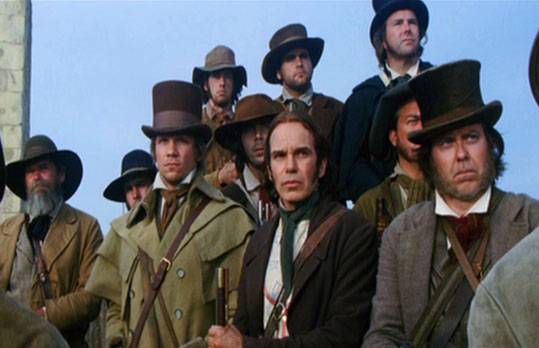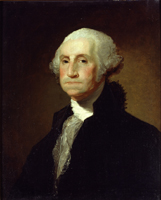Slate‘s David Greenberg (a Columbia PhD recently hired at Rutgers…congrats) examines the use and misuse of Iraq-Vietnam analogies.
Category: History
No Tenure for You.
Sean Wilentz reviews trained historian Condoleeza Rice’s sense of her field in light of her recent testimony, and finds her wanting. Notes Wilentz, “The American Historical Review’s notice of her first book, a study of Russia and the Czech army after 1948, charged that Rice ‘frequently does not sift facts from propaganda and valid information from disinformation or misinformation’ and that she ‘passes judgments and expresses opinions without adequate knowledge of the facts.’)” Well, dang, no wonder the Bushies jumped on hiring her for National Security Advisor…she sounds like a great fit.
Mission Compromised.

When writing about Touchstone’s new version of The Alamo, I find myself in a very similar situation as I was post-Hellboy. Part of me really wants to say nice things about this movie. The occasional film flourishes aside (such as Davy Crockett’s last stand), I think The Alamo for the most part tries to get the history right…Dennis Quaid’s Sam Houston is more a whiskey-doused speculator than American hero, Crockett is something of a congressman on the make, and there’s at least a nod to such ugly realities as American slavery and the land-grab nature of the whole Texian enterprise. Moreover, the Mexican view of the battle is also more fleshed out than we’ve come to expect in Alamo movies, even if Santa Anna is played like a straight-up Bond villain. Heck, compared to Gods & Generals, it’s like this movie was written by Howard Zinn and Noam Chomsky.
But, frankly, The Alamo turns out to be kinda dull through most of the middle hour. The set-up is well-done, the payoff is well-done (notwithstanding the twenty minute foray into the Battle of San Jacinto, which reminded me of the Doolittle Raid in Michael Bay’s lousy Pearl Harbor), but the twelve days of siege that comprise much of the movie is ultimately a bore. “Well, Col. Bowie, we’re all going to die.” “Yes sir, Lt. Col. Travis, that’s correct, we’re dead ducks. What do you think, Davy?” “I’m with you fellers. Mincemeat.” Part of the problem in this second act is that the film keeps slipping away from the history in favor of lapses into movie convention. We’ve got Davy Crockett and fiddle having their “King of the World” moment on the eve of the final battle. We’ve got the vaguely rousing “we will go down in history” speech by Travis. We’ve got Jason Patric — surely, the only actor who’s been poised on the brink of the big time longer than Billy Crudup — dying of consumption for interminable stretches, with all the deathbed movie tropes that entails. (Jim Bowie’s bout with sickness holds very little dramatic impact, given that we know he’s on the way out anyway.) For almost all of this section of the film, even as a history buff, I was fidgeting for the big battle to start, and I couldn’t help thinking (and feeling guilty about it) that all of this men-under-siege grimness was done better a year ago in The Two Towers.
Yet, the one major respite from the middle hour’s blandness is Billy Bob Thornton as Davy (“He prefers David”) Crockett. While Sam Houston is sidelined, William Travis is a (pretty good) unknown, and Jim Bowie is moaning and clutching the sheets, Billy Bob’s Crockett is just trying to keep his chin up, and he’s the only character here who seems both realistic and larger-than-life. Throughout the film, even when forced into the most goofy lines or plot devices, Billy Bob/Crockett has a grim, self-deprecating smile on his face that says both “Can you believe it? I’m Davy Crockett!” and “How the hell did I end up dying in this backwater mission?” And some of the best sequences in the film involve Davy ruminating on his own myth, or remembering his days as an Indian fighter. In sum, Billy Bob is so good here that I spent most of the film contemplating who else I’d cast alongside Thornton for the definitive American History miniseries. Christopher Walken as 1850 Henry Clay? Fred Thompson as James Buchanan? Adrien Brody as Mexican War-era Lincoln? The possibilities are endless.

Gene Machine.
“The vortex of the late nineteen sixties swallowed up not only Eugene McCarthy. It consumed a whole generation of liberal politicians and radical thinkers and culture heroes, from John Lindsay and Marshall McLuhan to Tom Hayden and Buckminster Fuller — a long list of ‘an idea whose time has come’ types whose time abruptly ran out. The survivors wandered, as McCarthy did, through the decades that followed, caricatures of their former world-historical selves, like old heavyweight champions working as greeters in casinos. You could say that these people failed; but what would success have looked like?” A bit too glib as always, Louis Menand examines Eugene McCarthy (by way of the new biography by Dominic Sandbrook.) I’m not sure if McCarthy is really a very good exemplar of “postwar liberalism,” but this sounds like an interesting read nonetheless. (Via Follow Me Here)
The End of History.
“The tradition of all the dead generations weighs like a nightmare on the brain of the living. – Karl Marx” Yeah, well, not anymore. As of this afternoon, the orals process is complete (although I do plan to fix up the subsite quite a bit), and I’m now ABD (All But Dissertation for you folks out there with real jobs.) I’m not going to go blow-by-blow into it here, but the exam went well for the most part…I definitely think I could’ve answered a few of the questions more lucidly, but so be it. At any rate, plan for updates here to resume their usual schedule, once I complete the rest of the week’s goal of doing absolutely nothing. Speaking of which, I think it’s nap-time…
7 Days.
Hey y’all…one week left until my orals, so expect it to be preternaturally quiet in these parts for that much longer. I’ve finished 98% of my reading at this point…I just need to spend the next few days getting psychically prepared for the test and fighting back the starting-to-become-omnipresent nervousness in my gut. Of the mocks I’ve taken, two went well and one went…not so well, but I’m chalking up that last one to sheer dogged tiredness and jetlag (from the recent break-even Vegas trip, which was decently fun, albeit being hampered by dark thoughts of the pending exam most of the time.) At any rate, I think I have the knowledge at this point…I just need to make I sure I can access it through the fog of encroaching anxiety.
Channeling Taney.
Columbia historian (and one of my interlocuters two weeks hence) Eric Foner takes a gander at William Rehnquist’s new book on the disputed 1877 election, and, aside from the obvious Bush v. Gore overtones, discovers that the Chief Justice’s grasp of history is as backward as his jurisprudence. “The scholarship on which Rehnquist relies is almost entirely out of date and his grasp of the complex issues of the Reconstruction era tenuous…That the Chief Justice of the United States sees national protection of blacks’ rights as a punishment imposed on whites is disheartening.” Hmm…let’s hope Rehnquist doesn’t decide to regale us with his thoughts on Dred Scott anytime in the future.
The Dotted Red Line.
Decision time for Terence Malick…will it be Benicio del Toro as Che Guevara or Colin Farrell as Capt. John Smith? My guess is he bails on both.
Chasing Helen.
Online today is the new trailer for Troy, and it’s quite something. I generally like Brad Pitt, but right now he’s looking (well, sounding) like the only potential problem here. Still, each and every scene with Brendan Gleeson and Brian Cox should be scenery-chewing fun. And where’s Sean “Odysseus” Bean?
President’s Day 2004


“As the sword was the last resort for the preservation of our liberties, so it ought to be the first to be laid aside when those liberties are firmly established.” – George Washington
“The dogmas of the quiet past, are inadequate to the stormy present. The occasion is piled high with difficulty, and we must rise — with the occasion. As our case is new, so we must think anew, and act anew. We must disenthrall ourselves, and then we shall save our country.” – Abraham Lincoln
